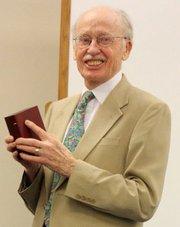
On Thursday, Feb. 2, 2012, Frederick Danker, 91, died at St. Louis University Hospital as a result of complications following a fall in his home in early January. He was in hospice care at the end, and under the careful and loving eye of his daughter, Kathie. I visited him several days before in that setting, and it was a fine visit, indeed. Though he was clearly failing, we discussed in a basic way some issues related to Greco-Roman culture (I: “Do you think that there is any connection between Hinduism and Gnosticism, with the former having influence in Alexandria and the Mediterranean world after the return of Alexander the Great’s expedition from the East?” Fred: “Ah, yes. I was just working on that (!).”). His interest did not flag. He asked me about my Mark commentary and how it was coming—he would never forget such details—and he was glad when I answered positively. We then did a devotion together, which he was very pleased to do. I had brought my pastor’s companion with me, received over forty years ago from an old pastor in the Milwaukee area, and it proved worthy, just as it always does, especially with its carefully crafted prayers. We ended with a personalized prayer for him, a baptized child of God, and concluded with the benediction, after which Fred raised both arms with hands in fists and said more strongly than any other statement that he had uttered heretofore, “AMEN!” And I, too, said Amen.
Fred Danker was one of the truly great NT scholars of the late 20th century, and not only in the English speaking world. He is best known for his revision of the 1953 Bauer-Arndt-Gingrich Greek-English lexicon (itself an English rendering of the German Bauer lexicon and abbreviated as BAG)—first, for the 1979 edition known as Bauer-Arndt-Gingrich-Danker (= BAGD) and lately (2000) for his quite thorough revision of the 1979 edition, now known as Bauer-Danker-Arndt-Gingrich (= BDAG). That final revision is quite a masterpiece, not only for its updating of data, but also and especially for its forays into lexicographical novelty, e.g., the use of both descriptors and one/two word translations (or glosses) for each entry (see, e.g., κωλύω). Thus, the meaning of each word is both described and translated, which helps immensely for people using this magisterial work in another culture and translating the Greek of the NT into another language. I was privileged to help him with this lexicon, and I am grateful that he afforded me the opportunity to do so. The work will remain the standard Greek lexicon of the NT for a generation, perhaps longer.
It was my privilege to invite Fred to talk about lexicography to a PhD Greek course several years ago here at Concordia, and it was a joy to listen to him then, as it always was. I regret that there will be no more such occasions. Indeed, I, and the scholarly world, will miss him, both for his wide-ranging, enquiring mind, and for his strong faith in Jesus Christ, his Lord.
